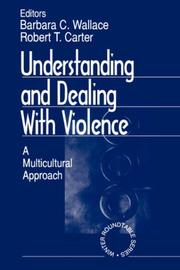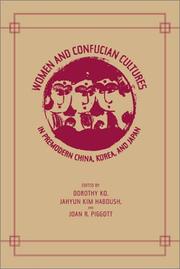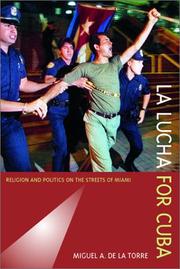| Listing 1 - 10 of 11 | << page >> |
Sort by
|

ISBN: 1280476761 9786610476763 184150887X 9781841508870 184150078X 9781841500782 184150081X 9781841500812 9781280476761 6610476764 Year: 2003 Publisher: Bristol Intellect Books Ltd
Abstract | Keywords | Export | Availability | Bookmark
 Loading...
Loading...Choose an application
- Reference Manager
- EndNote
- RefWorks (Direct export to RefWorks)
This anthology contains three plays (Ceremonial Kisses, Shading the Crime, and The Maternal Cloister) that feature a protagonist who is compelled to confront his or her particular oppressors. The critique of this oppression through theatre falls on particular social institutions and differs for each character. The main institutions under scrutiny are religion and the state. The plays are very different in style and include the use of physical theatre, naturalistic explorations of human rights abuses, and symbolic structures, puppets and poetry. The plays are supported by an analysis of their p
Oppression (Psychology) --- Criminal psychology --- Personality --- Psychology --- Social psychology --- Roberts, Christine,
Book
ISBN: 9055154148 Year: 2003 Publisher: Amsterdam Van Gennep
Abstract | Keywords | Export | Availability | Bookmark
 Loading...
Loading...Choose an application
- Reference Manager
- EndNote
- RefWorks (Direct export to RefWorks)
Islam --- Sociology of the family. Sociology of sexuality --- Religious texts --- Norms --- Oppression of women --- Book --- Discrimination
Book
ISBN: 1280477334 9786610477333 1841508764 9781841508764 1841508543 Year: 2003 Publisher: Bristol Intellect Books
Abstract | Keywords | Export | Availability | Bookmark
 Loading...
Loading...Choose an application
- Reference Manager
- EndNote
- RefWorks (Direct export to RefWorks)
Aimed to coincide with the centenary of Malraux's birth, André Malraux: An Age of Oppression is the first translation/annotated edition of Le Temps de mépris in a comprehensive format. The story (with the emphasis upon the psychological trauma suffered by a German political prisoner of the Nazis in the early 1930's) marks a significant moment in Malraux's literary oeuvre, and a prophetic insight into the historical implications of the situation prevailing in pre-World War II Nazi Germany.
Oppression (Psychology) --- Criminal psychology --- Personality --- Psychology --- Social psychology --- Malraux, André, --- Revue des lettres modernes. --- Série André Malraux --- André Malraux --- Malraux
Book
ISBN: 2747545083 Year: 2003 Publisher: Paris L'Harmattan
Abstract | Keywords | Export | Availability | Bookmark
 Loading...
Loading...Choose an application
- Reference Manager
- EndNote
- RefWorks (Direct export to RefWorks)
Depth psychology --- Jewish religion --- Social problems --- Sociology of minorities --- Sociology of the family. Sociology of sexuality --- Linguistics --- Anti-semitism --- Misogyny --- Psychoanalysis --- Racism --- Oppression of women --- Book

ISBN: 0761917144 0761917152 1452267502 1322419841 1506376169 9781506376165 9781452267500 9781322419848 9780761917144 Year: 2003 Volume: 3 Publisher: Thousand Oaks, Calif. : Sage Publications,
Abstract | Keywords | Export | Availability | Bookmark
 Loading...
Loading...Choose an application
- Reference Manager
- EndNote
- RefWorks (Direct export to RefWorks)
Multicultural in its approach to violence this volume will be of interest to students and academics in a range of disciplines. The contributors examine the role of cultural, social and historical factors in the manifestation and perpetuation of the cycle of human violence.
Violence --- Oppression (Psychology) --- Prejudices. --- Identity (Psychology) --- Respect for persons --- Oppression --- Préjugés --- Identité (Psychologie) --- Respect des personnes --- Psychological aspects. --- Prevention. --- Aspect psychologique --- Prévention --- Respect for persons. --- Identity (Psychology). --- Oppression (Psychology). --- Préjugés --- Identité (Psychologie) --- Prévention --- Conduct of life --- Persons --- Bias (Psychology) --- Prejudgments --- Prejudice --- Prejudices and antipathies --- Attitude (Psychology) --- Emotions --- Criminal psychology --- Personality --- Psychology --- Social psychology --- Personal identity --- Self --- Ego (Psychology) --- Individuality --- Conflict management --- Violent crimes --- Conflict control --- Conflict resolution --- Dispute settlement --- Management of conflict --- Managing conflict --- Management --- Negotiation --- Problem solving --- Social conflict --- Crisis management
Book
ISBN: 2748900030 Year: 2003 Publisher: Marseille Agone
Abstract | Keywords | Export | Availability | Bookmark
 Loading...
Loading...Choose an application
- Reference Manager
- EndNote
- RefWorks (Direct export to RefWorks)
Social stratification --- Sociology of minorities --- Sociology of the family. Sociology of sexuality --- Sociology of work --- Community organization --- Feminism --- Social class --- Trade unions --- Women's movements --- Oppression of women --- Feminist struggle --- Book --- Edited volume --- Discrimination --- France --- United States of America

ISBN: 1598750127 1280092203 0520927826 9786613520371 9780520927827 1417522607 9781417522606 9781598750126 0520231058 9780520231054 0520231384 9780520231382 9781280092206 6613520373 Year: 2003 Publisher: Berkeley University of California Press
Abstract | Keywords | Export | Availability | Bookmark
 Loading...
Loading...Choose an application
- Reference Manager
- EndNote
- RefWorks (Direct export to RefWorks)
Representing an unprecedented collaboration among international scholars from Asia, Europe, and the United States, this volume rewrites the history of East Asia by rethinking the contentious relationship between Confucianism and women. The authors discuss the absence of women in the Confucian canonical tradition and examine the presence of women in politics, family, education, and art in premodern China, Korea, and Japan. What emerges is a concept of Confucianism that is dynamic instead of monolithic in shaping the cultures of East Asian societies. As teachers, mothers, writers, and rulers, women were active agents in this process. Neither rebels nor victims, these women embraced aspects of official norms while resisting others. The essays present a powerful image of what it meant to be female and to live a woman's life in a variety of social settings and historical circumstances. Challenging the conventional notion of Confucianism as an oppressive tradition that victimized women, this provocative book reveals it as a modern construct that does not reflect the social and cultural histories of East Asia before the nineteenth century.
Women --- Confucianism --- Religions --- History. --- Social aspects. --- Women - China - History --- Women - Japan - History --- Women - Korea - History --- Confucianism - Social aspects --- 19th century. --- academic. --- asia. --- confucianism. --- confucius. --- construct. --- contemporary. --- cultural history. --- cultural studies. --- east asia. --- east asian culture. --- europe. --- feminism. --- feminist. --- international. --- modern world. --- oppression. --- scholarly. --- scholarship. --- social history. --- social studies. --- united states. --- victims. --- womens issues. --- womens studies. --- world history.

ISBN: 1597344907 0520936450 9786612762673 1282762672 9780520936454 1417520272 9781417520275 9781597344906 0520233921 0520233948 9780520233928 9780520233942 9781282762671 Year: 2003 Publisher: Berkeley University of California Press
Abstract | Keywords | Export | Availability | Bookmark
 Loading...
Loading...Choose an application
- Reference Manager
- EndNote
- RefWorks (Direct export to RefWorks)
To be a black woman of faith in the American South is to understand and experience spirituality in a particular way. How this understanding expresses itself in everyday practices of faith is the subject of Between Sundays, an innovative work that takes readers beyond common misconceptions and narrow assumptions about black religion and into the actual complexities of African American women's spiritual lives. Gracefully combining narrative, interviews, and analysis, this book explores the personal, political, and spiritual commitments of a group of Baptist women whose experiences have been informed by the realities of life in a rural, southern community. In these lives, "spirituality" emerges as a space for creative agency, of vital importance to the ways in which these women interpret, inform, and reshape their social conditions--conditions often characterized by limited access to job opportunities, health care, and equitable schooling. In the words of these women, and in Marla F. Frederick's deft analysis, we see how spirituality-expressed as gratitude, empathy, or righteous discontent-operates as a transformative power in women's interactions with others, and in their own more intimate renegotiations of self.
African American women --- Afro-American women --- Women, African American --- Women, Negro --- Women --- Religious life. --- Spiritual life. --- #SBIB:39A10 --- #SBIB:39A74 --- Religious life --- Antropologie: religie, riten, magie, hekserij --- Etnografie: Amerika --- african americans. --- american south. --- american women. --- baptist women. --- black americans. --- black experience. --- black religion. --- black women. --- christianity. --- cultural analysis. --- cultural politics. --- ethnographers. --- ethnography. --- faith and religion. --- female relationships. --- gender studies. --- nonfiction. --- personal interviews. --- regional history. --- rural south. --- social conditions. --- southern baptists. --- spiritual community. --- spiritual lives. --- spirituality. --- systemic oppression. --- women of faith.
Book
ISBN: 1417525428 1283291738 9786613291738 1597348457 0520937376 9781417525423 9781283291736 9781597348454 9780520937376 Year: 2003 Publisher: Berkeley : University of California Press,
Abstract | Keywords | Export | Availability | Bookmark
 Loading...
Loading...Choose an application
- Reference Manager
- EndNote
- RefWorks (Direct export to RefWorks)
From the time of Booker T. Washington to today, and William Julius Wilson, the advice dispensed to young black men has invariably been, "Get a trade." Deirdre Royster has put this folk wisdom to an empirical test-and, in Race and the Invisible Hand, exposes the subtleties and discrepancies of a workplace that favors the white job-seeker over the black. At the heart of this study is the question: Is there something about young black men that makes them less desirable as workers than their white peers? And if not, then why do black men trail white men in earnings and employment rates? Royster seeks an answer in the experiences of 25 black and 25 white men who graduated from the same vocational school and sought jobs in the same blue-collar labor market in the early 1990's. After seriously examining the educational performances, work ethics, and values of the black men for unique deficiencies, her study reveals the greatest difference between young black and white men-access to the kinds of contacts that really help in the job search and entry process.
African Americans --- Discrimination in employment --- Blue collar workers --- Employment. --- 1990s. --- african american men. --- black experience. --- black men. --- blue collar jobs. --- business economics. --- career. --- employment opportunities. --- employment rates. --- ethnographers. --- ethnography. --- human resources. --- industrial relations. --- inequality. --- job entry process. --- job search. --- job seekers. --- labor market. --- labor relations. --- nonfiction. --- oppression. --- professional contacts. --- race issues. --- racism. --- systemic racism. --- vocational school. --- wage gap. --- white networks. --- work ethic. --- young black men.

ISBN: 052093010X 1282357174 9786612357176 1597346977 9780520930100 1417519983 9781417519989 9781597346979 9780520235267 0520235266 9780520238527 0520238524 9781282357174 Year: 2003 Publisher: Berkeley : University of California Press,
Abstract | Keywords | Export | Availability | Bookmark
 Loading...
Loading...Choose an application
- Reference Manager
- EndNote
- RefWorks (Direct export to RefWorks)
For many in Miami's Cuban exile community, hating Fidel Castro is as natural as loving one's children. This hatred, Miguel De La Torre suggests, has in fact taken on religious significance. In La Lucha for Cuba, De La Torre shows how Exilic Cubans, a once marginalized group, have risen to power and privilege--distinguishing themselves from other Hispanic communities in the United States--and how religion has figured in their ascension. Through the lens of religion and culture, his work also unmasks and explores intra-Hispanic structures of oppression operating among Cubans in Miami. Miami Cubans use a religious expression, la lucha, or "the struggle," to justify the power and privilege they have achieved. Within the context of la lucha, De La Torre explores the religious dichotomy created between the "children of light" (Exilic Cubans) and the "children of darkness" (Resident Cubans). Examining the recent saga of the Elián González custody battle, he shows how the cultural construction of la lucha has become a distinctly Miami-style spirituality that makes el exilio (exile) the basis for religious reflection, understanding, and practice--and that conflates political mobilization with spiritual meaning in an ongoing confrontation with evil.
Cuban Americans-- Florida-- Miami-- Politics and government. --- Cuban Americans --- Exiles --- Christianity and politics --- Oppression (Psychology) --- United States Local History --- Regions & Countries - Americas --- History & Archaeology --- Politics and government --- Religion --- Social conditions --- Political activity --- Religious life --- Political aspects --- Politics and government. --- Religion. --- Social conditions. --- Political activity. --- Miami (Fla.) --- Religious life and customs. --- Christianity --- Church and politics --- Politics and Christianity --- Politics and the church --- City of Miami (Fla.) --- ميامي (Fla.) --- Mayāmī (Fla.) --- Mīyāmī (Fla.) --- Маями (Fla.) --- Mai︠a︡mi (Fla.) --- Μαϊάμι (Fla.) --- Miamo (Fla.) --- 마이애미 (Fla.) --- Maiaemi (Fla.) --- Майами (Fla.) --- מיאמי (Fla.) --- Miamia (Fla.) --- Majamis (Fla.) --- Мајами (Fla.) --- Majami (Fla.) --- マイアミ (Fla.) --- Маямі (Fla.) --- 迈阿密 (Fla.) --- Criminal psychology --- Personality --- Psychology --- Social psychology --- Political science --- Persons --- Aliens --- Deportees --- Refugees --- Cubans --- Ethnology --- ETATS-UNIS --- CUBAINS --- VIE RELIGIEUSE --- CHRISTIANISME ET POLITIQUE --- GROUPES ETHNIQUES --- MIAMI (FLORIDE) --- MIAMI --- FLORIDE --- CUBA --- RELIGION --- CONDITION SOCIALE --- belief. --- cuba. --- cuban missile. --- cuban. --- cultural history. --- cultural studies. --- dictator. --- dictatorship. --- elian gonzalez. --- exile. --- faith. --- fidel castro. --- florida. --- good and evil. --- hispanic community. --- hispanic. --- la lucha. --- marginalized groups. --- miami. --- oppressed people. --- outcast. --- religion. --- religious studies. --- social history. --- social studies. --- spirituality. --- united states. --- world history.
| Listing 1 - 10 of 11 | << page >> |
Sort by
|

 Search
Search Feedback
Feedback About UniCat
About UniCat  Help
Help News
News